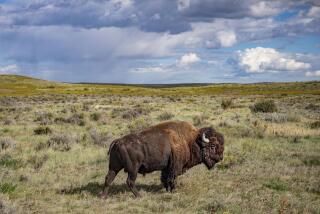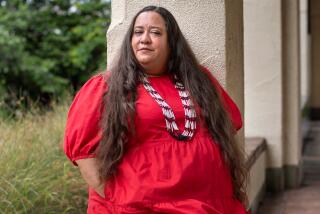Museum Program Sparks Hunger Strike
- Share via
August Spivey, a Native American activist of Newport Beach, began a hunger strike Wednesday to protest a Bowers Museum program honoring black soldiers who fought the Indians.
After eating two eggs over easy, potatoes and rye bread--his last meal for perhaps two weeks--Spivey, a 53-year-old Cherokee, stood outside the Santa Ana museum with a sign hanging from his neck: “Hunger Strike--Buffalo Soldiers Voluntarily Participated in Holocaust of Indians.”
“African Americans were trying to win their own freedom and they thought that it’d be all right to kill Indians,” he said. “They killed our women, our children, our men.”
Museum officials said they would not cancel the one-day, two-hour program honoring the men whom history calls the Buffalo Soldiers, maintaining that to do so would be censorship.
“We cannot allow any individual, even if we are sympathetic to their concern . . . to essentially exercise their desires to prevent people from telling their stories,” museum spokesman Brian Langston said.
In the late 1800s, African Americans in the 9th and 10th Cavalry got the name Buffalo Soldiers while battling Indians under the government’s program to settle the West.
“It’s important to black history because so much of it has been left out of the history books,” said Willia Edmonds, event organizer and president of the African Cultural Arts Council, an affiliate of the museum. “We need to raise the level of consciousness of Orange County residents who have not known before now about people who were instrumental in settling the land and making history.”
Still, the program is offending some Native Americans.
“It’s telling all of America’s children that it’s OK to slaughter people and then go into celebration about that,” said Terrie Restivo of the Orange County chapter of the National American Indian Movement, which is offering moral support to Spivey during his protest.
“They hunted us down the very same way they were hunted down when they were slaves,” Spivey said. “We cannot allow America to think that it was all right that they did this to us.”
More to Read
Sign up for Essential California
The most important California stories and recommendations in your inbox every morning.
You may occasionally receive promotional content from the Los Angeles Times.













